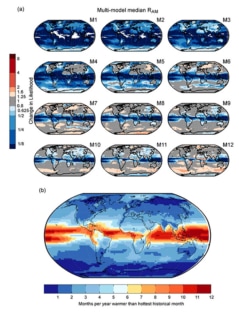

The poorest countries are likely to experience the most unfamiliar and problematic climates in a world of unbridled climate change, researchers in the UK and New Zealand have warned.
The scientists have invented a new approach to assess how easily countries can adapt to climate change, based on how many months of the year will bring temperatures that those countries have not experienced in recent memory. In their assessment, under an RCP8.5 warming scenario after 2050, richer countries will experience up to 4 months per year of unfamiliar temperatures, while poorer countries will experience up to 10 months per year.
The disparity is primarily due to the mid-latitude location of richer countries, which gives them distinct seasons and a greater range of annual temperatures, and so more experience on which to prepare for the future.
“As global temperatures continue to rise in the future, our results show that low-income countries will experience unprecedented temperatures much more frequently than high-income countries,” said Luke Harrington of the University of Oxford, UK. “This disparity will still exist even if global temperatures are kept to relatively modest levels – 2 °C, for example – and therefore needs to be carefully considered by decision makers, especially as countries are already preparing their adaptation strategies for a warmer world.”
Looking at a region’s past climate is a common way of judging how well it will be able to adapt to a certain climate in the future. Typically, in this method, climates are compared on a same-month basis, so that if, for example, the month of March is warmer in Sydney or Singapore for the period 2051–2100 than it was at any point in the period 1951–2000 – which it would be in an unbridled RCP8.5 climate scenario – one could conclude that it will be hard for those particular regions to adapt.
But as Harrington and colleagues point out, a more helpful answer would be provided if, for example, March-like temperatures from any months in the two periods could be compared. This alternative methodology shows that in the past, Sydney experienced March-like temperatures in March, November and December, and in the future, under RCP8.5, it will experience them in April and October. Three months versus two: not a huge change, the researchers say, and one that Sydney might well be able to adapt to.
On the other hand, this new methodology shows that Singapore experienced March-like temperatures for eight months of the year in the past, but will experience them only infrequently in January and February in the future. This, say the researchers, is a much more problematic change.
In generating this sort of comparison as a map of the entire world, Harrington and colleagues have shown that, under RCP8.5, low-income countries will experience 2–10 months a year that are warmer than the hottest month experienced in recent memory, while high-income countries will witness 1–4 months a year that are hotter than any month previously experienced. “We were surprised at the significance of the disparities found,” said Harrington.
The researchers believe these disparities will compound the effects of climate change on low-income populations who, living generally at lower latitudes, have not experienced great ranges of temperatures and are therefore ill-equipped to adapt to different temperatures when they come.
Even so, Harrington says that the results are not a universal indicator of adaptability. “[Some] projected changes, such as to crop yields or ecosystem services, are impacted by climate change through a cascade of different, and often complex, processes,” he added. “In this context, emergent warming signals alone would not be a representative metric of such changes, and more targeted modelling studies would be necessary.”
The team published the study in Environmental Research Letters (ERL).



